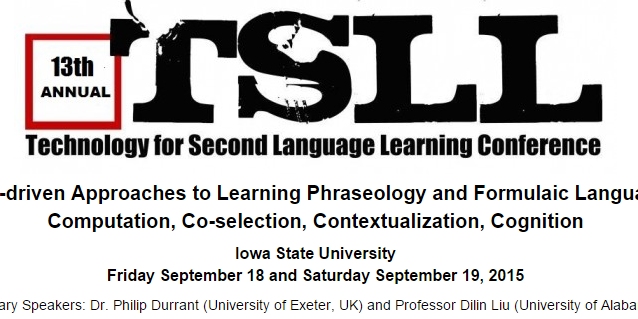The annual Technology for Second Language Learning (TSLL) conference brings together researchers, developers and practitioners who are interested in improvements and innovations in the uses of technology in language learning.
This year, the conference will focus on phraseology and formulaic language. Phraseology and the study of formulaic language encompass any research and teaching practices that explore multi-word units of language between the levels of lexis and syntax. Such units include, among others, fixed strings of words (e.g. ‘academic formulas’, ‘lexical bundles’, ‘ngrams’), more variable strings of abstract form/function items (e.g. ‘collostructions’, ‘semantic sequences’, ‘frames’), textual or mental combinations of individual items or word classes (e.g. ‘collocations’, ‘colligation’, ‘lexical priming’), and terminological units that may vary in meaning depending on the field where they are used (e.g. ‘multi-word expressions’, ‘formulaic sequences’).
We invite proposals for papers, posters and demos that address current practices, innovations, challenges, and research directions related – singly or in combination – to computational, cognitive, and pedagogic aspects of phraseology and formulaic language.
- Papers: Theory-oriented presentations or reports on completed empirical research related to the theme of the conference. The speaker will have 20 minutes to present, followed by 10 minutes for questions and comments.
- Posters and Demos: Presentations of work in progress, research at the planning phase, demonstrations of CALL tools and innovative teaching materials. All poster presenters will give a 5-minute introduction of their study to the whole audience, and will then host their posters for the rest of the session. This is a great opportunity for graduate students to discuss their research plans.
More information about the conference and how to submit your proposal, visit the conference website.







